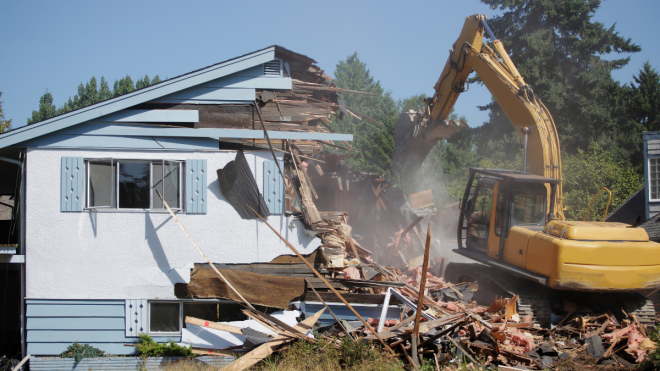Residential demolition requires meticulous planning and permits. RFC Excavating & Landscape Construction provides expert guidance and execution for a safe, compliant, and smooth process.
Whether it’s a deteriorated garage, an old shed, or a whole house, the decision to demolish an existing structure on your property to make room for new construction is a big one. Even though it’s exciting to start over, rushing into demolition without doing the necessary preparations can result in expensive delays, legal issues, and safety risks. Careful planning and obtaining the necessary permits are essential to the success of any residential demolition project. A simple project can become a lengthy nightmare if these crucial steps are skipped.
We at RFC Excavating & Landscape Construction are aware that demolition entails more than simply demolishing a building. It’s an exacting procedure that calls for thorough understanding of rules, adherence to safety precautions, and effective implementation. We walk homeowners through each important step, guaranteeing a seamless and legal demolition from beginning to end.
Discover the complete range of excavation, demolition, and site preparation services offered by RFC Excavating & Landscape Construction and start your project with assurance!
The Permit Conundrum
Before any wrecking ball swings, obtaining the required demolition permits is the most important step. These permits serve as more than just administrative roadblocks; they are necessary to guarantee environmental preservation, public safety, and compliance with regional zoning regulations. Depending on your state, county, and municipality, the precise permits needed will differ, but usually consist of:
- The main permit that gives formal authorization to demolish a building is the demolition permit.
- Permits for Utility Disconnection: essential for securely cutting off gas, electricity, water, and sewage lines before construction starts. In order to avoid mishaps and utility damage, this is crucial.
- Environmental permits might be necessary if the site requires particular erosion control measures or if the structure contains dangerous materials like asbestos or lead-based paint.
- Waste Disposal Permits: Guaranteeing the lawful transportation and disposal of waste at facilities that have been approved.
Heavy fines, stop-work orders, and even legal action may follow an attempt at demolition without the proper permits. With their in-depth knowledge of these rules, RFC Excavating & Landscape Construction can assist you in quickly obtaining all required approvals.
Did you know? Regardless of the age of the building, many municipalities require asbestos surveys to be finished before issuing a demolition permit. Ignoring this can result in serious consequences and health hazards!
Thorough Planning: The Basis for Achievement
What distinguishes a successful demolition from a chaotic one, aside from permits, is thorough planning. A thorough evaluation of the location and the building to be demolished is part of this phase:
- Site assessment involves locating nearby buildings, property lines, subterranean utilities, and possible obstacles to machinery access.
- A crucial step is the hazardous material survey. The building must be examined for dangerous substances like asbestos, lead-based paint, PCBs, and mercury prior to demolition. Before demolition can begin, certified professionals must carry out abatement if it is found.
- It is impossible to overestimate the importance of utility disconnection. Before demolition starts, all utilities (gas, water, sewer, electricity, and telecommunications) must be safely disconnected, capped, and inspected by their respective providers.
- Choosing the method for sorting, removing, and disposing of demolition debris is known as the debris management plan. Recycling wood, metal, and concrete are common examples of sustainable practices.
- Safety Procedures: creating a thorough safety plan that addresses site security, erosion prevention, and dust control for both employees and the surrounding area.
The project will remain on track and within budget thanks to this thorough planning, which also reduces surprises and improves safety.
Expert Performance: Homeowners’ Peace of Mind
Permits and planning are the first obstacles, but professional skills are needed for the actual demolition. To complete demolitions safely and effectively, RFC Excavating & Landscape Construction uses specialized equipment and employs trained operators. From the preliminary site preparation and utility disconnections to the actual structural removal and site clearing following demolition, we oversee the complete process.
Give RFC Excavating & Landscape Construction a call at (973) 304-0500 for professional advice and a thorough demolition plan.
Frequently Asked Questions (FAQs)
What is the average duration of the demolition permit procedure?
The length of time needed to obtain a demolition permit varies significantly depending on the municipality and project complexity. Depending on whether extensive utility coordination or hazardous material abatement is needed, it may take a few weeks to several months. It is always advised to begin this process early.
What happens to the debris from demolition?
Responsible debris management is a top priority for us at RFC Excavating & Landscape Construction. When feasible, we sort materials on-site, separating recyclables for further processing, such as metals, wood, and concrete. After that, non-recyclable materials are transported and disposed of in licensed, authorized waste facilities that adhere to all environmental laws.

 (973) 304-0500
(973) 304-0500
